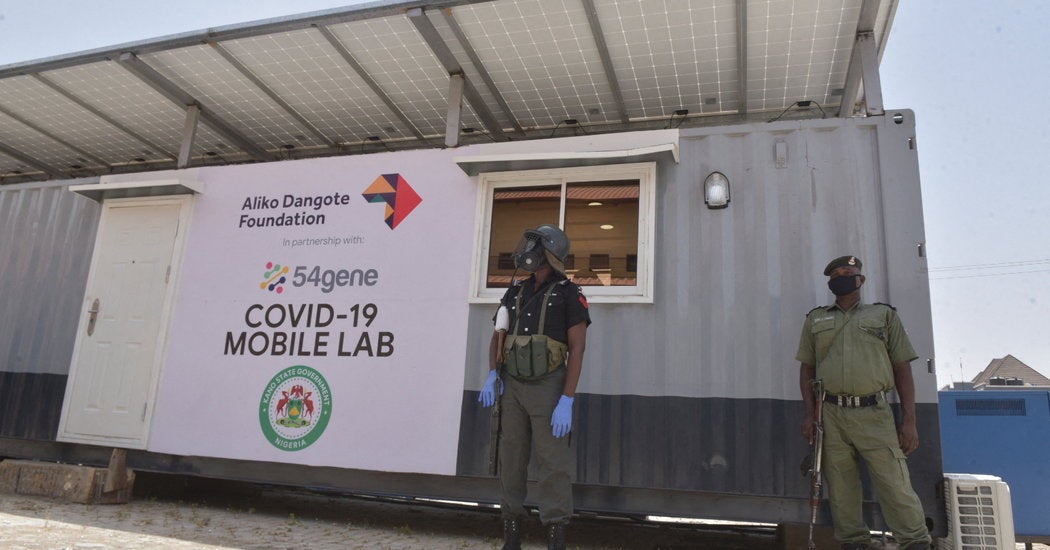Coronavirus: Nigeria’s varied responses to controlling COVID-19 – The Africa Report
different strokes
in depth
This article is part of the dossier:
By ‘Tofe Ayeni
Posted on May 13, 2020 08:47
In an effort to curb the spread of COVID-19 that has infected over 3000 people and seen over 100 people die in Nigeria, a five week lockdown was imposed as of 30 March in Abuja, Lagos and neighboring Ogun state.
READ MORE: Coronavirus: ECOWAS appoints Buhari as pandemic response ‘champion’
Wake up to the essential with the Editor's picks.
However, the federally-imposed measures did not necessarily take into consideration other states. How have they fared? We look at two states that took matters into their own hands ending up on opposite sides of the spectrum, followed by two others that benefitted from direct intervention by the federal government.
On 28 March, Governor of Kaduna State, Mallam Nasir El-Rufai, tested positive for coronavirus, having contracted the virus on a trip to Abuja. He subsequently infected a further four people. However, the state of Kaduna had already begun to put measures in place as soon as the virus made landfall with the country.
As a result, Kaduna was the first state to announce a lockdown starting on 25 March, three days before their first case (Governor El-Rufai). This lockdown prevented people from the Federal Capital Territory and Lagos from entering the state. The initial lockdown was for 30 days, and when it ended, it was extended for a further 30 days.
The deputy governor, Dr Hadiza Sabuwa Balarabe, is a public health consultant, and so she and the Commissioner of Health, Dr Amina Baloni, took charge of the situation right from the start. These two women had acquired much experience in controlling infectious diseases following their work against Ebola and Lassa Fever. They knew extraordinary measures had to be taken in their state immediately.
Kaduna’s strategy
Wake up to the essential with the Editor's picks.
The public health system in Kaduna is not capable of dealing with a deluge of cases, so steps were taken were to ensure that the cases, when they do come, would be few and far between.
The initial strategy in Kaduna was, in the words of El-Rufai: “[to] keep it out, delay it, and make sure it’s in small numbers that Kaduna could manage,” hence an early lockdown.
An early lockdown meant the state government was faced three main problems:
To address these problems the state government decided to:
Furthermore, a large portion of the informal sector remained operational. While the enforcement of the lockdown is quite difficult, and compliance is uneven, Governor El Rufai says he believes it is better to have “50% success than to allow 0% social distancing.”
Unfortunately, some of Kaduna’s neighbours have not taken such proactive steps, putting the state at great risk from what is happening outside their borders.
As of 12 May, Kaduna has 111 confirmed cases, and three deaths.
Kano State has become a highly worrisome case in Nigeria.
Fears about a breakout across the state came from gravediggers who were reporting a sudden increase from digging a couple of graves a day, to around 40. Space was running out to bury bodies, and hospitals were rejecting patients for fear that they had the virus.
Although official numbers of deaths are below 100, residents fear that the authorities are largely underreporting, with more than 500 feared dead due to the virus.
State authorities, when they did acknowledge the unusually high number of deaths, denied that they were of any relation to the coronavirus.
Weak health system
The healthcare infrastructure in Kano, like in many parts of northern Nigeria, is extremely poor, and with a 13.4 million-strong population, a large outbreak would be disastrous. The state’s only testing centre was shut down on 22 April for five days due to fears of contamination, leading to a backlog that has not since been rectified.
The state government has been slow and almost unwilling to implement lockdown measures. Unlike neighbouring Kaduna State, the lockdown was only implemented under the instruction of President Buhari, who on 28 April ordered a total lockdown in the state for 14 days.
However, on 2 May, Governor Abdullahi Umar Ganduje announced a relaxation of the lockdown for two days – 4 and 7 May from 10am to 4pm – to ease the economic hardships on the residents. Face masks were made compulsory for these two days.
The situation in Kano remains dire and the state government is being criticized for being neither proactive nor reactive.
As of 12 May, Kano has confirmed 666 cases and 32 deaths.
The lockdown in Lagos State, the commercial hub of Nigeria, began on the 30 March, and lasted in its initial state for five weeks. The same was done in Ogun State and the Federal Capital Territory (Abuja), being, at the time, the three areas with the majority of cases. On 4 May, the restrictions were eased.
LISTEN: Coronavirus: Easing the lockdown – Johannesburg, Nairobi and Lagos
President Buhari noted that, as a result of the strict lockdown, “citizens have lost their means of livelihood. Many businesses have shut down.” Thus, the federal government deemed it necessary to open the economy.
Easing of restrictions
These updated measures now allow people to move around more, but a curfew is in place from 8pm to 6am, and everyone must wear a face mask in public.
However, the ban on large gatherings (social and religious) remains, with Governor Sanwo-Olu saying: “All places of worship are to remain closed to congregational services until further notice. This prohibition applies also to religious gatherings that may be conducted in homes, such as communal Tarawih prayers, our house fellowships.”
READ MORE: Nigeria Lagos states healthcare ‘mission impossible’
A ban on non-essential interstate passenger travel and the closure of schools, bars and cinemas, remains in effect.
As of 12 May, Lagos has 1,933 cases and 33 deaths.
In the Federal Capital Territory (Abuja) measures are largely the same as in Lagos State.
The lockdown also began on 30 March, and was eased on the same day of 4 May.
Face masks are mandatory in public and there is a ban on non-essential interstate travel.
Businesses have been allowed to reopen provided they decontaminate their offices, are able to uphold social distancing, and provide hand sanitizers.
Schools and places of worship remain closed, cultural events have been cancelled, and restaurants are only allowed to operate on a takeaway basis.
As of 12 May, the FCT had 359 cases and six deaths.
We believe that Africa is poorly represented, and badly under-estimated. Beyond the vast opportunity manifest in African markets, we highlight people who make a difference; leaders turning the tide, youth driving change, and an indefatigable business community. That is what we believe will change the continent, and that is what we report on. With hard-hitting investigations, innovative analysis and deep dives into countries and sectors, The Africa Report delivers the insight you need.
GETTING INTO GEAR
controversial control
COVID complications
changing lifestyles
Wake up to the essential with the Editor's picks.
Wake up to the essential with the Editor's picks.
Sign up to get more of The Africa Report




